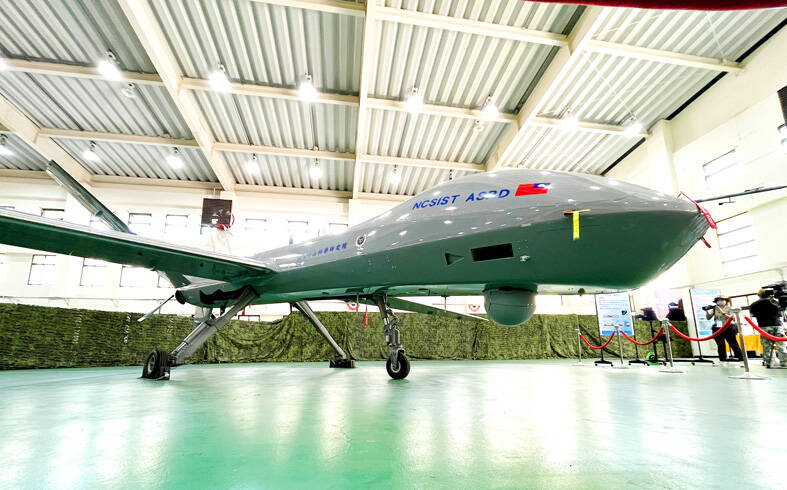The National Chungshan Institute of Science and Technology (NCSIST) became the world’s 60th-largest arms-producing and military service company last year, the Stockholm International Peace Research Institute (SIPRI) said in a ranking published on Monday.
The state-run defense firm was included in the ranking for the first time, the SIPRI said, adding that it reported gross sales of US$2 billion last year.
The SIPRI did not contact the NSCIST and likely used publicly available information for its assessment, a senior defense official said, speaking on condition of anonymity.

Photo: CNA
The NCSIST last year recorded sales of NT$57.9 billion (US$1.89 billion), a figure that is expected to surge to NT$120 billion next year, he said.
The doubling of sales is in large part due to the Ministry of National Defense’s program to augment the sea and air capabilities of Taiwan’s armed forces, he said.
The procurement of ship and aircraft-launched missiles — a major component of the plan — would alone contribute NT$58.19 billion to the NCSIST’s income, meaning that it would likely move up the rankings next year, he said.
The NCSIST is capable of manufacturing 70 Hsiung Feng III supersonic anti-ship missiles and 131 units of either the Hsiung Feng II (HF-2) subsonic anti-ship missile or the Hsiung Sheng cruise missile per year, he said.
The firm is also capable of manufacturing 96 Tien Kung II air defense missiles and 50 Wan Chien air-to-ground cruise missiles per year, he said.
The arms and military services sector reported global sales of US$592 billion last year, achieving annual growth of 1.9 percent despite worsening supply chain challenges caused by the COVID-19 pandemic and Russia’s war in Ukraine, the SIPRI said.
The US continues to assert its dominance in the defense industry, and the top five arms manufacturers were Lockheed-Martin, Raytheon, Boeing, Northrup-Grumman and General Dynamics, it said.
Six Russian firms were also in the top 100, but their year-on-year sales growth slowed to 0.4 percent, indicating stagnation in the Russian sector, it said.
The 21 Asia and Oceania-based arms companies included in the ranking posted sales of US$136 billion last year, an increase of 5.8 percent year-on-year, it said, adding they comprised five Japanese, four South Korean and eight Chinese companies.
The Chinese defense firms reported year-on-year sales growth of 6.3 percent, outperforming the average for the Asia and Oceania grouping, it added.

The Chinese Communist Party (CCP) is pushing for residents of Kinmen and Lienchiang counties to acquire Chinese ID cards in a bid to “blur national identities,” a source said. The efforts are part of China’s promotion of a “Kinmen-Xiamen twin-city living sphere, including a cross-strait integration pilot zone in China’s Fujian Province,” the source said. “The CCP is already treating residents of these outlying islands as Chinese citizens. It has also intensified its ‘united front’ efforts and infiltration of those islands,” the source said. “There is increasing evidence of espionage in Kinmen, particularly of Taiwanese military personnel being recruited by the

ENTERTAINERS IN CHINA: Taiwanese generally back the government being firm on infiltration and ‘united front’ work,’ the Asia-Pacific Elite Interchange Association said Most people support the government probing Taiwanese entertainers for allegedly “amplifying” the Chinese Communist Party’s propaganda, a survey conducted by the Asia-Pacific Elite Interchange Association showed on Friday. Public support stood at 56.4 percent for action by the Mainland Affairs Council and the Ministry of Culture to enhance scrutiny on Taiwanese performers and artists who have developed careers in China while allegedly adhering to the narrative of Beijing’s propaganda that denigrates or harms Taiwanese sovereignty, the poll showed. Thirty-three percent did not support the action, it showed. The poll showed that 51.5 percent of respondents supported the government’s investigation into Taiwanese who have

Left-Handed Girl (左撇子女孩), a film by Taiwanese director Tsou Shih-ching (鄒時擎) and cowritten by Oscar-winning director Sean Baker, won the Gan Foundation Award for Distribution at the Cannes Critics’ Week on Wednesday. The award, which includes a 20,000 euro (US$22,656) prize, is intended to support the French release of a first or second feature film by a new director. According to Critics’ Week, the prize would go to the film’s French distributor, Le Pacte. "A melodrama full of twists and turns, Left-Handed Girl retraces the daily life of a single mother and her two daughters in Taipei, combining the irresistible charm of

South Korean K-pop girl group Blackpink are to make Kaohsiung the first stop on their Asia tour when they perform at Kaohsiung National Stadium on Oct. 18 and 19, the event organizer said yesterday. The upcoming performances will also make Blackpink the first girl group ever to perform twice at the stadium. It will be the group’s third visit to Taiwan to stage a concert. The last time Blackpink held a concert in the city was in March 2023. Their first concert in Taiwan was on March 3, 2019, at NTSU Arena (Linkou Arena). The group’s 2022-2023 “Born Pink” tour set a